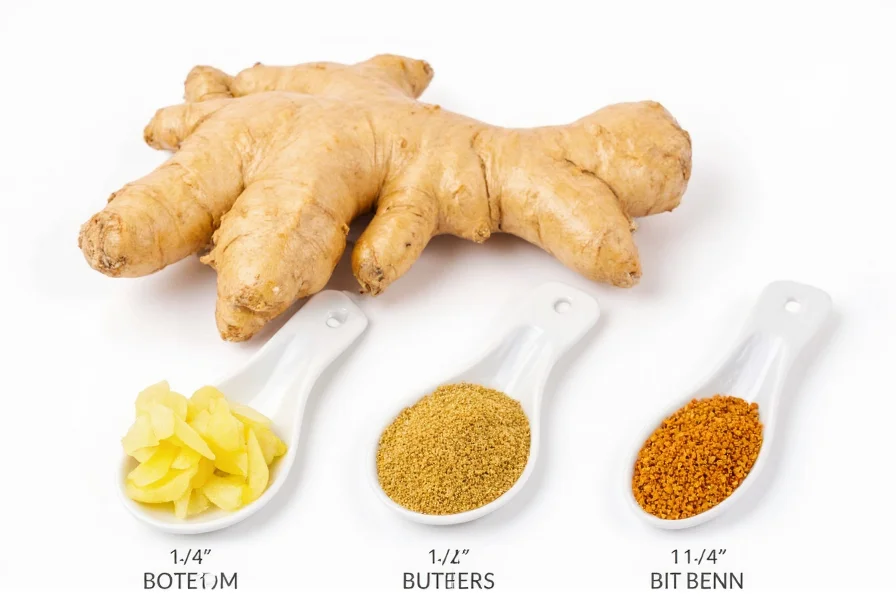Understanding proper ginger consumption is essential for maximizing health benefits while avoiding potential side effects. Ginger root has been used for centuries in traditional medicine and modern research continues to validate its numerous health properties, from reducing nausea to combating inflammation. However, like any bioactive compound, the dose makes the medicine - and exceeding recommended amounts can lead to digestive discomfort or interact with certain medications.
Scientifically Supported Ginger Dosage Guidelines
Multiple health authorities and clinical studies provide consistent recommendations for ginger consumption. The European Medicines Agency, the World Health Organization, and the American Herbal Products Association all suggest that 1-3 grams of fresh ginger root per day represents a safe and effective amount for general health maintenance. This translates to approximately:
- 1/4 to 1.5 teaspoons of freshly grated ginger
- 1/2 to 1.5 teaspoons of ginger juice
- 0.25 to 1 gram of dried ginger powder
- 75-225 mg of ginger extract in supplement form
These recommendations apply to healthy adults seeking general wellness benefits. For specific therapeutic purposes like managing morning sickness during pregnancy or reducing post-operative nausea, healthcare providers may recommend targeted dosing protocols under supervision.
Forms of Ginger and Their Equivalent Measurements
Ginger comes in various forms, each with different potency levels. Understanding these differences is crucial when determining your daily intake:
| Ginger Form | Equivalent to 1g Fresh Ginger | Daily Maximum |
|---|---|---|
| Fresh ginger root | 1 gram | 3-4 grams |
| Dried ginger powder | 0.25 grams | 0.75-1 gram |
| Ginger extract (standardized) | 75 mg | 225-300 mg |
| Ginger tea (brewed) | 1 cup (240ml) | 3-4 cups |
Health Benefits at Different Consumption Levels
Research indicates that different ginger dosages provide varying health benefits:
1 gram daily - This modest amount provides gentle digestive support, mild anti-inflammatory effects, and may help with occasional nausea. It's particularly suitable for beginners or those with sensitive stomachs.
1-2 grams daily - This moderate range offers more pronounced anti-inflammatory benefits, potentially helping with joint pain and muscle soreness. It's also effective for managing mild nausea and supporting cardiovascular health.
2-3 grams daily - At this therapeutic range, ginger demonstrates significant effects on reducing inflammation markers, managing menstrual pain, and providing stronger anti-nausea effects. Many clinical studies on ginger's benefits use doses within this range.
3-4 grams daily - This higher therapeutic dose is typically used short-term (2-3 weeks) for specific conditions like severe nausea during chemotherapy or acute inflammatory conditions. It should be used under medical supervision.
Safety Considerations and Maximum Limits
While ginger is generally recognized as safe, consuming more than 4 grams daily can lead to:
- Heartburn and gastric irritation
- Mouth and throat irritation
- Increased bleeding risk (especially when combined with blood thinners)
- Lowered blood sugar levels (caution for diabetics)
- Interactions with certain medications including blood pressure drugs
Long-term consumption of high doses (above 4 grams daily) hasn't been thoroughly studied, so maintaining the recommended daily limits is advisable for ongoing use. If you experience any adverse effects, reduce your intake or discontinue use.
Special Population Considerations
Certain groups should modify their ginger consumption:
Pregnant women - While ginger effectively reduces morning sickness, most experts recommend limiting intake to 1 gram daily. Consult your healthcare provider before using ginger during pregnancy, especially if you have a history of miscarriage or are at risk of preterm labor.
Individuals with gallstones - Ginger may increase bile production, which could exacerbate symptoms. Consult your doctor before regular consumption.
People taking blood thinners - Ginger has mild blood-thinning properties. If you take medications like warfarin, discuss ginger consumption with your healthcare provider.
Those with diabetes - Ginger may lower blood sugar. Monitor levels closely if consuming therapeutic doses.
Practical Ways to Incorporate Ginger Into Your Daily Routine
Finding the right balance of ginger in your diet can be simple with these practical approaches:
Start your day with ginger tea by steeping 1/4 teaspoon of freshly grated ginger in hot water for 5-10 minutes. This provides gentle digestive support without overwhelming your system. For cooking, add 1/2 teaspoon of grated ginger to stir-fries, soups, or salad dressings. When using ginger in smoothies, 1/4 to 1/2 teaspoon of fresh ginger complements fruit flavors while providing health benefits.
If you prefer supplements, look for standardized extracts containing 5% gingerols (the active compounds), and follow the dosing instructions carefully. Remember that supplement potency varies significantly between brands.

When to Consult a Healthcare Professional
While ginger is generally safe for most people, consult a healthcare provider before starting regular consumption if you:
- Are pregnant or breastfeeding
- Have a bleeding disorder
- Take medications regularly, especially blood thinners or diabetes medications
- Have gallstones
- Are scheduled for surgery within the next two weeks
- Experience persistent digestive issues
Healthcare professionals can help determine the appropriate ginger dosage based on your individual health status and any medications you're taking, ensuring you receive benefits without risks.
Conclusion
Consuming 1-3 grams of fresh ginger root daily provides significant health benefits while staying within safe limits for most adults. By understanding the different forms of ginger and their equivalent measurements, you can easily incorporate this powerful root into your wellness routine. Remember that more isn't always better - sticking to evidence-based recommendations ensures you maximize ginger's therapeutic potential while minimizing any potential side effects. As with any dietary change, listen to your body and adjust your intake as needed for optimal results.
Frequently Asked Questions
Can I consume ginger root every day?
Yes, you can safely consume ginger root daily within recommended limits of 1-3 grams of fresh ginger. Daily consumption at these levels provides consistent anti-inflammatory and digestive benefits without significant risk of side effects for most healthy adults. However, if you experience any adverse reactions like heartburn or mouth irritation, reduce your intake or take periodic breaks from regular consumption.
What happens if I eat too much ginger in one day?
Consuming more than 4 grams of ginger in one day may cause side effects including heartburn, diarrhea, mouth irritation, and increased bleeding risk. Some people experience a burning sensation in the mouth or stomach discomfort. In rare cases, extremely high doses (above 6 grams daily) might interact with medications or exacerbate conditions like gallstones. If you accidentally consume too much ginger, drink plenty of water and monitor for symptoms, reducing your intake in subsequent days.
How much ginger is safe during pregnancy?
Most healthcare providers recommend limiting ginger intake to 1 gram (approximately 1/4 teaspoon of grated fresh ginger) per day during pregnancy. This amount has been shown to effectively reduce morning sickness without safety concerns in most studies. However, pregnant women should consult their healthcare provider before using ginger regularly, especially if they have a history of miscarriage, are at risk of preterm labor, or have other pregnancy complications.
Is 4 grams of ginger too much per day?
Four grams of ginger represents the upper safety limit for short-term therapeutic use (typically 2-3 weeks). While not immediately dangerous for most healthy adults, regularly consuming 4 grams daily long-term hasn't been thoroughly studied. For ongoing daily use, most health authorities recommend staying within the 1-3 gram range. If you're using 4 grams for a specific therapeutic purpose like severe nausea, do so under medical supervision and for limited durations.
How do I measure fresh ginger root accurately?
To measure fresh ginger accurately, peel the root and use a kitchen scale for precise gram measurements. If you don't have a scale, 1 gram of fresh ginger equals approximately 1/4 teaspoon grated. For reference: 1-inch piece of ginger (about 1/2 inch thick) yields roughly 11 grams when grated. When grating, pack the ginger lightly in the measuring spoon - don't press down firmly. Remember that dried ginger is more concentrated, with 1 gram of fresh ginger equivalent to about 0.25 grams of dried powder.











 浙公网安备
33010002000092号
浙公网安备
33010002000092号 浙B2-20120091-4
浙B2-20120091-4